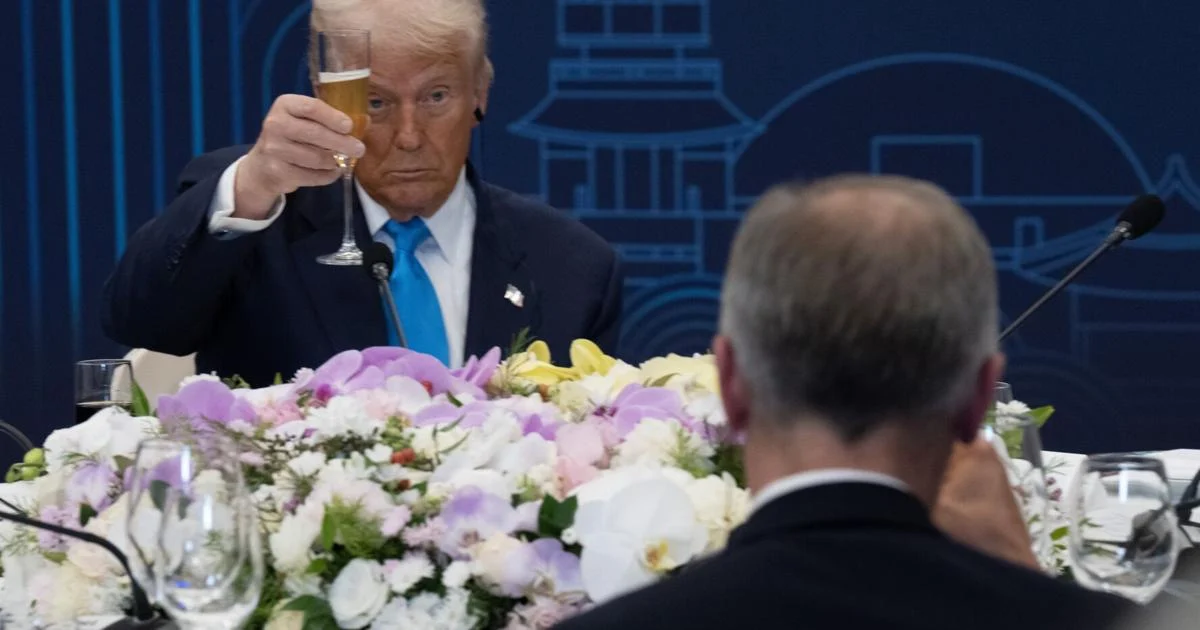Copyright thestar

In early October, Premier Doug Ford sat and stared at the giant floating head of Howard Lutnick as the U.S. commerce secretary explained that Canada won’t be allowed to keep its automotive manufacturing industry. Lutnick was addressing the crowd virtually, and Doug Ford was sitting in the front row. “America is first, and Canada can be second,” Lutnick declared. “Car assembly is going to be in America and there is nothing Canada can do about it,” Lutnick told the summit, according to sources at the off-the-record meet who spoke to my colleagues Tonda MacCharles and Robert Benzie. “The question is, ‘what is Canada going to do instead?’” The premier stewed. Earlier that day, on Oct. 8, Prime Minister Mark Carney was readying to leave Washington, D.C. Where Carney had once promised a full, comprehensive deal with America, that possibility had gone out the window. It had become clear, as far back as the chaotic G7 summit in Kananaskis in June, that Trump could not conceive of an actual free trade deal with Canada — he wanted an agreement stuffed with tariffs and compensation for all the harms America supposedly suffered at our hands. So, now, the prime minister was shuttling back and forth to America, negotiating side deals, trying to lessen the pain of America’s punitive tariffs on our steel, lumber and automotive industries. Even that was a slog: A source in the prime minister’s office says they were only about 60 per cent of the way toward a deal. It wasn’t clear that they would ever solve the other 40 per cent. Carney had been pitching areas of co-operation — a pledge to build Trump’s beloved Golden Dome defence project, and a plan to revive the defunct Keystone XL project — but that didn’t seem to be enough. Both Carney en route back to Ottawa and Ford in that Toronto conference room were coming to realize the same thing: Trump doesn’t want a deal, he wants subservience. The president was earnest when he said “we don’t need them to make our cars … we don’t need their lumber … we don’t need their oil and gas.” Carney was resigning himself to more negotiations, and a hope that the constant dialogue with Trump could set up Ottawa well for its upcoming review of USMCA. Ford, ever the loose cannon, opted for another approach: He tapped a conservative consulting firm to draw up a commercial to run on a massive ad spend during the World Series. It would quote President Ronald Reagan arguing that high tariffs kill jobs and that free trade is the “way to prosperity.” And, as we know, it would incur the ire of Trump himself — and, ironically, prompted threats of a new round of new tariffs. The saga has led to more dismay amongst those who are still hoping for a deal. On Monday night, the members of the Canadian American Business Council convened at the National Gallery for their annual “State of the Relationship” reception. It didn’t need stating that the relationship isn’t faring well. The few Americans in the room urged caution, insisting that Trump is still a rational actor whose ego needs constant managing. It was still possible, they said, for Canada to sell cars, wood and oil to America; Ottawa just needed to be even more deferential to the president. The U.S. Ambassador to Canada Pete Hoekstra was less calm — marching up to David Paterson, Ford’s trade envoy to D.C, and cussing him out in front of the event attendees over the ad. Ford later called the tirade “unbecoming of an ambassador.” With negotiations suspended, the Americans feigning outrage, and more tariffs on the way, Ford and Carney risk succumbing to finger-pointing. The premier’s office is already spinning that Carney saw the ad before air, and the Liberals are grumbling that Ford ran the ad in the name of performative self-interest. Rather than turning on each other, however, both men should see the end of these negotiations for what it is: Good news. I’ve been speaking to a host of federal and provincial officials this week, and many say the same thing: If it wasn’t these ads, it would have been something else — Carney’s entreaties with Beijing; or Ottawa’s shopping-around for another fighter jet, to reduce our order of F-35s; or our complaint at the USMCA dispute tribunal. Trump wanted an excuse to blame us for why his big beautiful deal hadn’t materialized. We’re incredibly lucky that Trump finally decided to blow up these unproductive negotiations in such a way that drew attention to a basic fact: These tariffs are unproductive, ineffective and illegal. And to that end, Trump just underscored what we need to do next. “Canada is trying to illegally influence the United States Supreme Court,” Trump wrote on Truth Social last Friday, “in one of the most important rulings in the history of our Country.” As Ford’s people point out, there was more than a week between Trump seeing the ad and his social media tantrum. Far from being a bit of spur-the-moment anger, the rupture was intentional. And Trump’s post offers a useful clue as to why Trump is so mad: The Supreme Court. One thing often unsaid in our current trade war is that, due to the separation of powers in the American system, Trump does not have the authority to levy most, if not all, of these tariffs. Trump is pretending as though he has this power, and he is genuinely worried about what will happen if the top court confirms that he does not. While Trump is probably giving Ford too much credit for surreptitiously meddling at the Supreme Court, it’s actually not a bad idea. Canada should be trying to convince the Supreme Court to stop Trump’s insane abuses of power. On a moral level, America’s constitutional order needs all the defenders it can get. On a strategic level, Canada will be much better off living next to a state where the legal order still prevails and where the president is constrained. There’s precedent for this. In 1987, a Canadian fish importer challenged a very particular set of tariffs (which had been enacted by none other than Ronald Reagan). An appeals court reminded America that its constitution vests the power of taxation and trade to Congress — power the president can only wield if it is delegated by the legislative branch. This Canadian lawsuit helped develop the test for determine when and where the president oversteps their authority. Earlier this year, an appeals court used that test to find there is “no clear congressional authorization” for Trump’s tariffs. Trump has appealed that case up to the Supreme Court, arguing that these tariffs are meant to address a suite of emergencies — drug trafficking, immigration, and so on. And, he argues, the International Emergency Economic Powers Act gives him authority to address those crises, real and imagined. But the Act affords him no such power. And even if it did, the Act certainly doesn’t allow for additional tariffs because the president was offended by an ad. All else being equal, the Supreme Court will rule these tariffs illegal and remove them. But we’re not in normal times. The court of Chief Justice John Roberts has already made clear that it is willing to afford Trump broad new powers to rule, even if it means offering some creative interpretations of the constitution. The last chance to convince the court of its constitutional obligations is coming up. Oral arguments begin on Nov. 5, and the White House is clearly worried about how things will go. On Tuesday, some 200 lawmakers — Democrat and Republican — filed a brief before the court, calling the tariffs nothing short of a “usurpation of Congress’ power.” Canada can’t intervene in the case directly. But it could certainly provide some legal help and analysis to those who are. We should make that case as loudly and clearly as possible. We can’t be sure that Trump will abide by any such ruling. But we can at least encourage the watchdogs of the American constitution to protect their own democracy. It is a more effective route than counting to haggle, barter, flatter and negotiate with the president, hoping against hope that he will suddenly abandon a core part of his illiberal shakedown effort. Even if it invites more spittle-flying lectures from Trump’s angry ambassador, we should say plainly that the emperor wears no clothes.



